Jerry Jones and the Temple of Doom: Dallas vs. Buffalo for “America’s Team” Designation
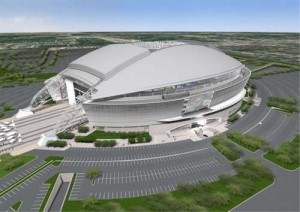
Is the new Dallas Cowboys Stadium a model for how to build a sports venue or a temple to greed and gluttony?
Are the Dallas Cowboys still America’s team, or are they America’s bad dream?
I recently watched Jerry Jones show off the monument he has built to American excess on the Today Show. It struck me as hauntingly ironic that Dallas, one of the demographic icons of the excesses and extravagance of the recent bubble, is opening a billion dollar stadium, in the middle of the debris of the bubble burst, and that Jerry Jones, owner of the Dallas Cowboys, is chatting it up with Matt and Al on what is supposed to be a morning news program.
It is news of course, but not in the way it is being covered. NBC is just whoring their Sunday Night Football coverage in an infomercial disguised as news. And to think the Today Show used to be serious about journalism. But that’s another topic.
Perhaps I wouldn’t be angry enough to write about it, however, if it wasn’t for the fact that this new stadium represents everything the NFL has not been, but appears poised to become. If my worst fears are realized, and Jerry Jones has his way, it will be the end of the NFL world as we know it.
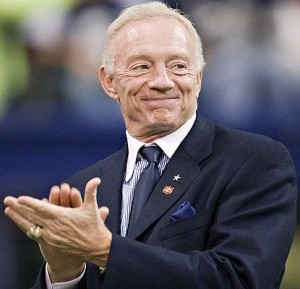
Jerry Jones has spent 20 years building the Dallas Cowboys into a merchandising juggernaut.
From the day he bought the Dallas franchise in 1989, Jerry Jones let it be known he was a new breed of NFL owner. He was—and is– a shark. He is out to get all he can for himself and his team at the expense of the weaker members and the league. He is determined to bring social Darwinism to what has been a cooperative.
No one was surprised, then, when shortly after taking over the Cowboys, Jones attempted and partially succeeded at making individual licensing agreements for Cowboys merchandise. It was the first chink in the armor of revenue sharing that is now more at risk than any time in history, as the current collective bargaining agreement (CBA) nears its end.
Jerry Jones has made it known from day one that he opposes the revenue sharing plan. He has done what he can to undermine it. And now that the CBA is about to term out, he has an opening big enough for any fullback to charge through, to kill it.
What does Jerry Jones want?
If each franchise is allowed to keep all revenues it generates from TV rights to logo merchandising, then Dallas will be among the big winners. They have established themselves as a national brand (“America’s team”). Smaller and less prosperous markets will be left to survive on their own gate revenues and whatever merchandising and media deals they can make on their own.
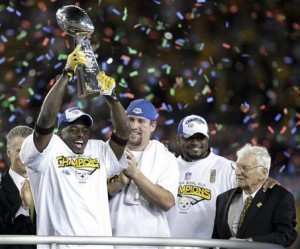
Revenue sharing and a salary cap have helped ensure that unlike in baseball, every team in the NFL has a chance to compete for a championship.
That may not sound so bad. After all they do that in baseball. But the NFL is different. Its TV exposure is huge. Watching the NFL on Sundays, Monday nights, and now even Thursday nights, is the true national pastime, much more than baseball ever was (on television at least). A franchise’s equal share in TV revenue and merchandising, is also huge.
For a small market team, to lose an equal share of that revenue puts the first several nails in their coffins, even if they sell 80,000 seats till the cows come home. Because the gate alone is not enough to pay the players. (And when the cows come home, it will be the Cowboys driving them.)
Why should we care, unless we live in a small market town? The same reason Jerry Jones should be careful what he wishes for. If the Dallas Cowboys become “America’s bullies” or “America’s spoiled rich guys,” he’s out of business. The NFL’s stock in trade is parity. And you can’t have parity without revenue sharing.
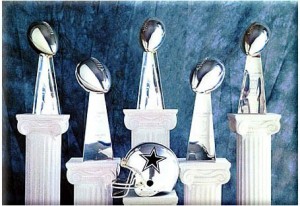
The Dallas Cowboys have won five Super Bowls, but last claimed the trophy in January 1996. It will probably take a successful fight against the salary cap for Jerry Jones and his team to win their sixth.
Parity is what has made the NFL great as an institution as well as a business, a sports league, and a key source of entertainment, civic pride, and regional cohesion in the United States. Parity is the reality behind the truth of the expression, “on any given day, in any given stadium, any given team can defeat any other team.” We know this is true, and we also know that on any given day not only will one or two heavy underdogs win, but many more teams will give a royal scare to highly favored teams before they finally succumb. That’s what makes the NFL worth watching.
If odds makers can comfortably pick winners by looking at a team’s balance sheets rather than their scouting reports, they might as well just cancel the games and hold a giant celebrity party.
Unfortunately, it isn’t just a matter of keeping the smaller market teams competitive, it is a matter of keeping the small market teams in the league.
Forget about storied 50+ year old franchises like Buffalo, Cleveland, Pittsburgh. Yes, even Pittsburgh, the NFL’s most successful team (on the field) in the Super Bowl era will be at risk of becoming the Los Angeles Platinums, without a continuation of revenue sharing.
If you don’t believe me, look baseball. Look at the Pittsburgh Pirates. Same town as the Steelers. Same fans. Same market. But the Pirates haven’t made the playoffs in 17 years. Theirs is one of the smallest payrolls in Major League Baseball. Any player that rises to marquis level on their roster is quickly lost to free agency. It’s only a matter of time when tradition and fan loyalty will not be enough to keep the Pirates from being pirated by a baseball version of Jerry Jones.
Again, if you’re not from there, why should you care?
Parity is important not only because it makes the league more competitive and thus makes the action on the field, as opposed to the action in the sky boxes and sidelines, more interesting, but because it creates great moral conflict scenarios that benefit the sport in general as well as each individual franchise including the richest.
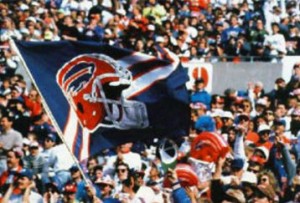
The Buffalo Bills have one of the most loyal fan bases in the NFL.
If all the teams were concentrated in the glitziest, largest and wealthiest markets, what has until now been a subliminal subplot in the game, the moral and mortal combat pitting David versus Goliath, will devolve into a cat fight between Paris Hilton and the Olsen Twins– just a couple of rich bitches ruining each other’s makeup.
On the other hand, when you’ve got Buffalo versus Dallas, Cleveland versus New York, Detroit versus anybody, you’ve got a primeval archetypal morality play.
So if Jerry Jones has his way, get ready for the LA Bills, with a greenback logo instead of a prairie animal on their helmets, because the move to LA gives the term “Bills” a whole new meaning. The Jacksonville Jaguars might become LA’s second team, but again their cat logo is replaced by an image of the luxury car of the same name.
Then the dominoes start to fall. The Browns, Vikings, Steelers, and Lions might be the next to go. I can envision the 15 or 20 largest markets with 32 teams. Or maybe we’d be down to the top ten US markets with the rest of the franchises playing in foreign venues. How about the Singapore Saints, the Shanghai Seahawks, the Dubai Dolphins, Abu Dabi Bengals, the London Lions?
Teams would no longer have any tradition or historical connection to their new markets. Any “loyalty” they might attract from fans would be the fair-weather variety because it is roots, tradition, historical connection between the franchise and the “home” city, that brings fans out as enthusiastically in the middle of a ten year playoff drought (Buffalo sold a record 55,000 season tickets this year, for example) would not exist. The tradition of going to the Bills game with Dad, perpetuated from generation to generation would be erased.
And that can’t be good for the league. That can’t even be good for Jerry Jones.
He may want the Cowboys to win most of the time, but he wants the outcome to be at least slightly in doubt, and he wants at least some of the games to come down to the last play because suspense sells tickets, even if it is a cable TV ticket. Unless the Harlem Globetrotters are the model, Dallas, Houston, New York and LA need Buffalo, Cleveland, Pittsburgh and Detroit, and need them to be competitive.
So is Dallas truly America’s team: the post boom, Great Recession America’s Team? Or might the Buffalo Bills be better candidate? How about a little comparison and contrast.
Dallas, especially with their new “house,” represents everyone who overbuilt, overbought, and over-financed. Buffalo, with their 36 year old Ralph Wilson (formerly known as Rich) Stadium has kept the starter house and put on a new coat of paint.
Dallas is the Big Dog. Buffalo is the underdog.
Dallas is Bentleys. Buffalo is beater cars.
Dallas is oil. Buffalo is the energy crisis.
Dallas is banker’s bonuses. Buffalo is unemployment checks.
Dallas is country clubs. Buffalo is block clubs.
Dallas is boom, Buffalo is bust.
Dallas is Glitz. Buffalo is rust.
Dallas is botox. Buffalo is skin cream.
Dallas is working out at the gym. Buffalo is working outside with Jim.
Dallas is longhorns. Buffalo is long johns.
Dallas is sand. Buffalo is snow.
Dallas is the odds Buffalo beats more often than anyone would think.
Dallas is power. Buffalo is people.
Dallas is your mortgage company. Buffalo is your neighbor.
Debbie does Dallas but Bonnie loves Buffalo.
Dallas is in your face. Buffalo is in your heart.
So which one is America’s team now? You be the judge.
But more importantly, which one’s NFL will survive? Jerry Jones’ or Ralph Wilson’s.
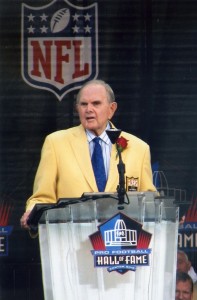
The Buffalo Bills have had one owner in their 50 year history. Ralph Wilson was inducted into the Pro Football Hall of Fame in 2009.
Ralph Wilson is the only owner the Buffalo Bills have ever had. Ninety year old Wilson is not what he used to be, but he is the embodiment of what a good NFL owner should be. As one of the founders of the old AFL, (American Football League, which merged with the NFL in 1966) Wilson loaned other owners money to keep the league afloat.
If you watched Wilson’s induction to the Pro Football Hall of Fame along with one of his former employees, Bruce Smith, you know this. It is probably not a coincidence that Wilson has actually lived in Detroit all his life. The two cities share a lot more than Lake Erie.
Bills fans have been critical or even distrustful of Wilson at times because he doesn’t live in town, but he has embodied loyalty in a way that few local owners would have done. (Just ask fans of the NBA Buffalo Braves, who were sold out by a local owner).
One other thing you learned about Wilson if you watched the induction is that he always voted NO to moving a franchise. Always. And sometimes, he was the only no vote. Jerry Jones could learn a thing or two from Ralph Wilson.
It’s only football, but it’s also so much more than football. It’s what bonds Buffalonians and small market fans in numerous towns to their city and to each other. It’s what gives ghetto kids, immigrants, laid off construction workers, downsized middle managers and underemployed Ph.d’s the hope to believe that they can still compete in America, that they can not only get to whatever is the Superbowl in their lives, but win it as well.
From a standpoint of vicarious empowerment, from a standpoint of a metaphor that brings the American Dream to life year after year and embodies it, the NFL as we know it must be saved. May Ralph Wilson live forever. Let Jerry Jones buy a baseball team.
John Howell is a regular contributor to Sports Then and Now.
FYI…no sand or oil in Dallas…
I have a video from the Paris Hilton movie on my website. To bad it got leeched onto the internet for everyone to look at. She did not want it to be public as it was her ex boyfriend Rick Salomon that leeched it.
Oh my goodness! Awesome article dude! Thanks, However I am going through issues with your RSS.
I don’t understand the reason why I can’t join it. Is there anybody having similar RSS
problems? Anybody who knows the answer can you kindly respond?
Thanks!!
My homepage – Klondike Cheats
This bring up certain memories.
Dallas vs the buffalo, this is a grand finally between the two grand teams. Both teams are in the form; let’s see what will be happened after their crash with each other. According to my opinion the buffaloes are in more farms.
This sort of article are worthy documentation.
bully pitbull.